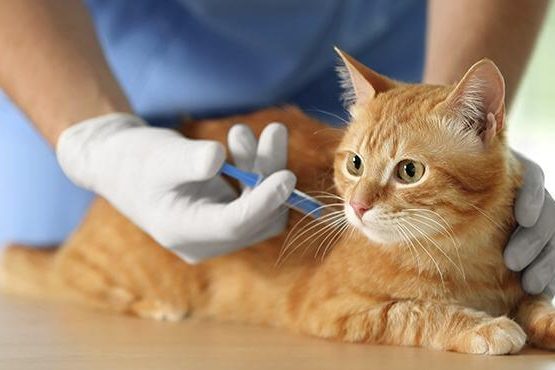Protect Everyday Adventures
Don’t Wait, Vaccinate!
Is your pet at risk?
Did you know everyday adventures put your pet at risk of disease? These diseases are generally difficult to treat or life threatening and some can even affect humans.
Whether your pet is young, old or in between, the good news is you can help protect them and reduce the spread of disease with yearly vaccinations, so book in with your vet today.

Canine Diseases
Parvovirus
Parvovirus
Every vet or nurse you speak to will sadly have seen a dog with parvovirus, likely recently.
This common nasty virus spreads in the poo of infected dogs but can survive in the environment for over a year, despite freezing temperatures and disinfectants. This means your dog can catch it anywhere another dog has explored.
Symptoms & Severity
Dogs tend to suffer from profuse diarrhoea and vomiting with extreme tiredness and no appetite amongst other signs. It is usually fatal without intensive treatment in a veterinary hospital.
Fact(s)
One gram of infected faeces can infect over 10 million susceptible dogs 1 with a survival rate as low as 9% if left untreated.2
Leptospirosis
Leptospirosis
This is a bacterial disease which is widespread in the UK and can be rapidly fatal in dogs and humans.
Rodents carry leptospirosis, but humans and dogs do not need to touch a rodent to catch it. You or your dog can get it through direct or indirect contact with urine of dogs or rodents. e.g. whilst swimming in, or drinking from UK watercourses or stagnant water, or from contact with contaminated soil.
Symptoms & Severity
Dogs can suffer from all sorts of signs so it can be hard to spot. Signs range from fever and tummy problems to liver/ kidney failure and sudden death. It can be rapidly fatal and if, after intensive treatment, dogs survive, they can have long term health issues.
Fact(s)
All dogs are at risk regardless of age, breed and lifestyle and there is often a spike in cases after local flooding.
Contagious cough / Kennel cough
Contagious cough / Kennel cough
Ask any vet or nurse and they will tell you how commonly they see this.
Despite often being called ‘kennel cough’ dogs catch this from anywhere other dogs explore; the park, daycare, training classes, shared water bowls outside shops….
Symptoms & severity
Dogs suffer with a highly distressing, distinctive hacking cough which can last for weeks, with or without fever and other symptoms, with more serious health issues in certain dogs.
Fact(s)
In a survey, only 20% of cases were thought to come from kennels, the rest through regular adventures. 3
Distemper
Distemper
This highly infectious virus is thankfully rare in the UK now due to vaccine uptake, but is still seen. It spreads directly from dog to dog but does not survive well in the environment.
Symptoms & severity
Distemper is often fatal and can affect your dog’s skin, tummy, breathing and nervous system.
Fact(s)
Unvaccinated dogs still catch this in the UK.
Infectious hepatitis
Infectious hepatitis
This is a highly contagious virus that spreads through contact with saliva, urine or poo from infected dogs and can survive for several days to weeks in the environment.
Symptoms & severity
Causes liver failure with dogs suffering from signs including tummy pain, lack of appetite and fever. It is rapidly fatal in puppies but can cause death in dogs of all ages.
Fact(s)
Although thankfully rare in the Ireland thanks to vaccination uptake, unvaccinated dogs still catch it.

Feline Diseases
Cat Flu (Herpesvirus & Calicivirus)
Cat Flu (Herpesvirus & Calicivirus)
Every vet in the UK will be dealing with cats that suffer with these viruses.
They are very common and highly contagious and can be spread by direct or indirect contact with infected cats which means your cat can catch it from an area an infected cat has explored.
Symptoms & severity
Affected cats suffer from conjunctivitis, sneezing, snotty noses and mouth ulcers making it painful to eat. They can be difficult to treat and recovery from initial signs can take a long time.
Fact(s)
Once caught, cats are usually infected for life with signs returning at times of stress.
Panleukopaenia
Panleukopaenia
Infected cats shed this virus in their faeces and like parvovirus in dogs, it can survive for over a year in the environment.
Symptoms & severity
Cats suffer from profuse vomiting and diarrhoea, but sadly kittens may die before any signs are seen.
Fact(s)
Less than 50% of cats will survive this, even with intensive care treatment. 4
Feline leukaemia (FeLV)
Feline leukaemia (FeLV)
Thanks to regular vaccination, we see less of this in the UK now as this virus needs close contact to spread between cats, but sadly it is still seen.
Symptoms & severity
This virus decreases a cat’s ability to fight infection and affected cats develop serious health problems including cancer and anaemia.
Fact(s)
Once the 2nd biggest killer of young cats after traffic accidents, the average survival time after diagnosis is 2.4 years. 5

Rabbit Diseases
Myxomatosis
Myxomatosis
Sometimes called ‘Myxy’, this is a serious and widespread virus. It affects both pet and wild rabbits in the UK and is spread by biting insects (e.g. mosquitos and fleas) and between rabbits through eye and nose discharge.
Symptoms & severity
This virus is frequently fatal. It causes tumour like swellings and decreases the rabbit’s ability to fight infection, so they tend to catch additional bacterial infections that cause severe respiratory disease.
Facts
One of the top 8 causes of death in UK pet rabbits. 6
Rabbit Haemorrhagic Disease (RHD)
Rabbit Haemorrhagic Disease (RHD)
Sometimes called RHD or viral haemorrhagic disease, this is a highly infectious and widespread virus that we encounter frequently in the UK in pet and wild rabbits. It spreads quickly through direct or indirect contact with infected rabbits.
Symptoms & severity
This virus can cause bleeding problems and affects the liver. It is sadly frequently fatal with some rabbits dying before any signs are seen.
Facts
Until 2010, this disease was caused by one strain (RHDV-1), but this strain evolved into RHDV-2. Thankfully vaccines have been developed to cover this new strain too.7

Where do fleas hide? How to find them?
Discover what are fleas favourite places to hide in your home!

Ticks are tiny but dangerous creatures, whose existence depends on consuming blood. Find out the most common myths about ticks!

The importance of vaccinations for your pet
Vaccination for dogs and cats is an essential preventive measure of protecting them against diseases.
References
1. MSD Animal Health Internal study REF DP PLUS 004.
2. Mylonakis, ME et al (2016). Canine parvoviral enteritis: an update on the clinical diagnosis, treatment, and prevention, Vet Med (Aukl). 7:91-1003. 3. MSD Animal Health Global canine cough quint survey 2022.
4. ABCD Guidelines for Feline Panleukopenia, 2024. Available at: https://www.abcdcatsvets.org/guideline-for-feline-panleukopenia. Accessed February 2025
5. MSD Manual: Veterinary Manual 2024. Available at: https://www.msdvetmanual.com/generalized-conditions/feline-leukemia-virus/feline-leukemia-virus-disease. Accessed February 2025
6. O’Neill, DG et al (2020). Morbidity and mortality of domestic rabbits (Oryctolagus cuniculus) under primary veterinary care in England, Vet Record 186(14):451-451
7. MSD Animal Health Hub. Available at: https://www.msd-animal-health-hub.co.uk/ahp/rabbit-diseases Accessed February 2025


 Go To United States
Go To United States Austria
Austria Belgium
Belgium Czech Republic
Czech Republic Denmark
Denmark Europe
Europe Finland
Finland France
France Germany
Germany Greece
Greece Hungary
Hungary Ireland
Ireland Israel
Israel Italy
Italy Netherlands
Netherlands Norway
Norway Philippines
Philippines Poland
Poland Portugal
Portugal Romania
Romania Saudi Arabia
Saudi Arabia Slovakia
Slovakia South Africa
South Africa Spain
Spain Sweden
Sweden Switzerland
Switzerland Turkey
Turkey United Kingdom
United Kingdom